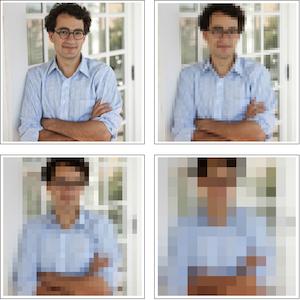
- 14 Apr 2017
In this story, we talk to Simon DeDeo, an assistant professor in the School of Social and Decision Sciences at Carnegie Mellon University, external faculty at the Santa Fe Institute, and the instructor of the new Introduction to Renormalization tutorial on Complexity Explorer.
Give us some background on Renormalization Theory and your tutorial
Renormalization comes out of physics. It's why we built the LHC. Most of physics since 1950---including that bit of physics that predicts the Higgs boson---has been about what happens when you build a theory that works well at one scale, and try to extrapolate it to another.
In physics renormalization terrifies even the best students. What I realized in my time at the Santa Fe Institute was that hidden in that thicket of mathematics was a set of beautiful ideas whose essence could be conveyed using examples that go well beyond the physical sciences.
In the tutorial itself, I make a special effort to use models and ideas that complex systems students might have encountered before. We talk about renormalization using JPEGs, Markov Chains, and Cellular Automata. When I introduce examples from physics, I make sure to give the background and some of the basic ideas, and I pick some of the best and clearest we have: the Ising model and something called Debye Shielding in plasma physics. I’m pleased that the physics examples are simple, but can take a good student a long way into real cutting-edge research.
Near the end I have a little fun, pulling in a favourite, slightly fringe idea about something called the Krohn-Rhodes theorem. Finally, at the end I pull everything together, and show how these ideas connect to big questions in cognitive science, artificial intelligence, and machine learning.
Why is understanding Renormalization important for students interested in complex systems science?
Secretly, renormalization is about much more than physics. To be a good scientist often means being good at picking the right level of description, the right units of analysis. How much detail should your model have? Should an economic theory include an account of psychology? Should a psychological theory include an account of neural wiring? When can you gloss things over, and what's the right way to do it?
Complex systems make these questions even more urgent. We often get the level of detail wrong when we start. We think oh, we can ignore this, but then, much later, when our models don't work we realize that we glossed over something we needed to include. Or, what is more common, we include too much detail, and our models become over-specific, over-specialized, and unwieldy. We're trying to build a theory of market crashes, and our models include the price of seventy grades of crude oil. Or we're modeling image perception under uncertainty and we're writing in the strength of a student's Oedipal complex.
Renormalization helps us think through these problems, by giving us a language for what it means when a detail at one scale does, or doesn't, matter at another.
How have you used Renormalization in your own research?
I've written papers on the theory of renormalization; one I'm particularly proud of is from 2011, and called "Effective Theories for Circuits and Automata" https://arxiv.org/abs/1106.5778 Recently, with Josh Grochow, Eric Libby, and David Wolpert, we've dived into a big framework-style paper that introduces something called State-Space Compression, https://arxiv.org/abs/1409.7403. Finally, Sarah Marzen and I have thought a lot about how biological and neural systems go about building simplified descriptions of the world, including in two recent papers, on the evolution of lossy compression, https://arxiv.org/abs/1506.06138 and https://arxiv.org/abs/1606.04057 A lot of these ideas are in a lecture I gave at the Perimeter Institute back in 2014, http://www.perimeterinstitute.ca/videos/state-space-compression-coarse-graining-and-averaging-life-and-mind
But renormalization and the underlying concepts are everywhere in my research. I spend a lot of time studying people, and fundamentally, what people do when they go out in the world is produce crappy, simplified, coarse-grained descriptions about what's going on. When I try to understand what those descriptions are doing, how they're working, or not working, and what their implications are, I'm thinking constantly about the basic concepts we introduce in this tutorial. Many of these ideas make it into a big paper I wrote in 2015 called “Major Transitions in Political Order”. https://arxiv.org/abs/1512.03419
What are some resources for a student that wants to dig deeper into Renormalization?
I got so engaged in producing these lectures that I ended up producing a great deal of original material. Meanwhile, the material that has been around before we put in a new order, and with a new spin. I'm really proud with how the lectures turned out.
For those reasons, along with the MOOC itself, we're going to release a companion article, "Renormalization for Intelligent People". It walks students more slowly through the big ideas of the MOOC itself, and provides a bunch of references to books, articles, and websites for students who want to go further.
Finally, let’s cover one piece of current research you’re working on that you’re particularly excited about.
I’m really interested in play. Like, literally, play—how kids play, how adults play. Thinking about play has given me new insight into some of the most amazing things we do as a species, including poetry, string theory, and the kinds of self-expression and community building we see in fan fiction and on sites like Wikipedia.
It’s a great time to work on this problem. I think we have some new tools and concepts from information theory that give us a new angle on these questions, and with my students and colleagues at Indiana University, we’re making some progress. Some of these tools can be found in an article on Charles Darwin, https://arxiv.org/abs/1509.07175 ; meanwhile, Alexander Barron, Elise (Yizhi) Jing, and Jenny Huang, students in complex systems at IU, are also coming up with new angles on these questions.
If we survive the next few decades without blowing ourself up, then we will have probably continued to liberate even more of our species from the drudgery of day-to-day survival. Play will become an increasing source of meaning in life—and perhaps even a problem: how can people learn to play? You can see these anxieties in arguments over the guaranteed minimum income: if people don’t have to work, won’t they go crazy? How will they find meaning? I just got back from Europe, where a number of groups are thinking along parallel lines, and I’m really excited to see what happens in the next few years.
